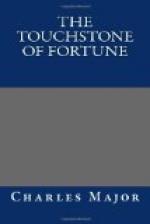Soon after the foregoing conversation, George went to Paris and remained a few days with King Louis, whom he had known since early youth. His evil star brought him back to London the day before Frances left Sundridge, though, he knew nothing of her departure. I did not know of his return, nor did I know of his remote connection with the terrible events attending her arrival till long after they happened.
* * * * *
While Frances, Roger, and the fat horses were struggling through the mud, the darkness, and the rain, a band of congenial spirits were gathered about the huge fireplace in the taproom of the Leg Tavern in King Street, Westminster, a stone’s throw from Whitehall Palace. There was my Lord Berkeley, the king’s especial crony, who possessed all his royal master’s vices without any of his Majesty’s meagre virtues. He imitated the king in dress, manner, cut of beard, and even in the use of Charles’s favorite oath, “Odds fish!” an expletive too inane even to be wicked, being a distortion of the words “God’s flesh.” There was young Crofts, the king’s acknowledged son, Duke of Monmouth by grace of his mother’s frailties. He was a living example of the doctrine of total depravity in what purported to be a man. There was John Churchill, a very decent fellow in a politic way, though in bad company. He afterward married my laconic cousin Sarah, whose shrewdness made him the first Duke of Marlborough, and last, I regret to chronicle, was George Hamilton, resting from his labors at self-reform. Soon after dark another congenial spirit, the most pusillanimous of them all, young William Wentworth, Sir William’s son and Roger’s nephew, entered the taproom dripping with rain. Before going to the fire, he called Crofts and Berkeley to one side. Placing his arms about their necks, he drew their faces close to his and made the following remarkable communication in a low whisper:—
“At the supper table, to-night, my worthy sire let slip the information that my good uncle of Sundridge had been expected this afternoon. He had not arrived when I left home fifteen minutes ago, but probably is stuck in the mud a mile or two outside of London on the St. Albans road.”
“Let him stick! What is it to us?” asked Crofts.
“Thus much it is to me,” answered Wentworth. “He has with him a thousand pounds in gold, while I, his gentleman nephew, have not a jacobus to my name. Now the question becomes one of mere humanity. Shall we allow my good uncle to stick in the mud, or shall we sally forth like good Samaritans, relieve him of a part of his load, and make travelling easier for the dear old man?”
“As men and Christians, we must hasten to his help,” declared Crofts.
“But how about Hamilton and Churchill?” asked Berkeley, whose courage was not of the quality to make a good highwayman. “Crofts has invited them here for a feast with us. How shall we get rid of them? Hamilton has become a mere milksop, and Churchill always was too cautious and politic for this sort of a game. Not only will they refuse to go with us if we tell them of our purpose, but they will try to keep us from going.”




